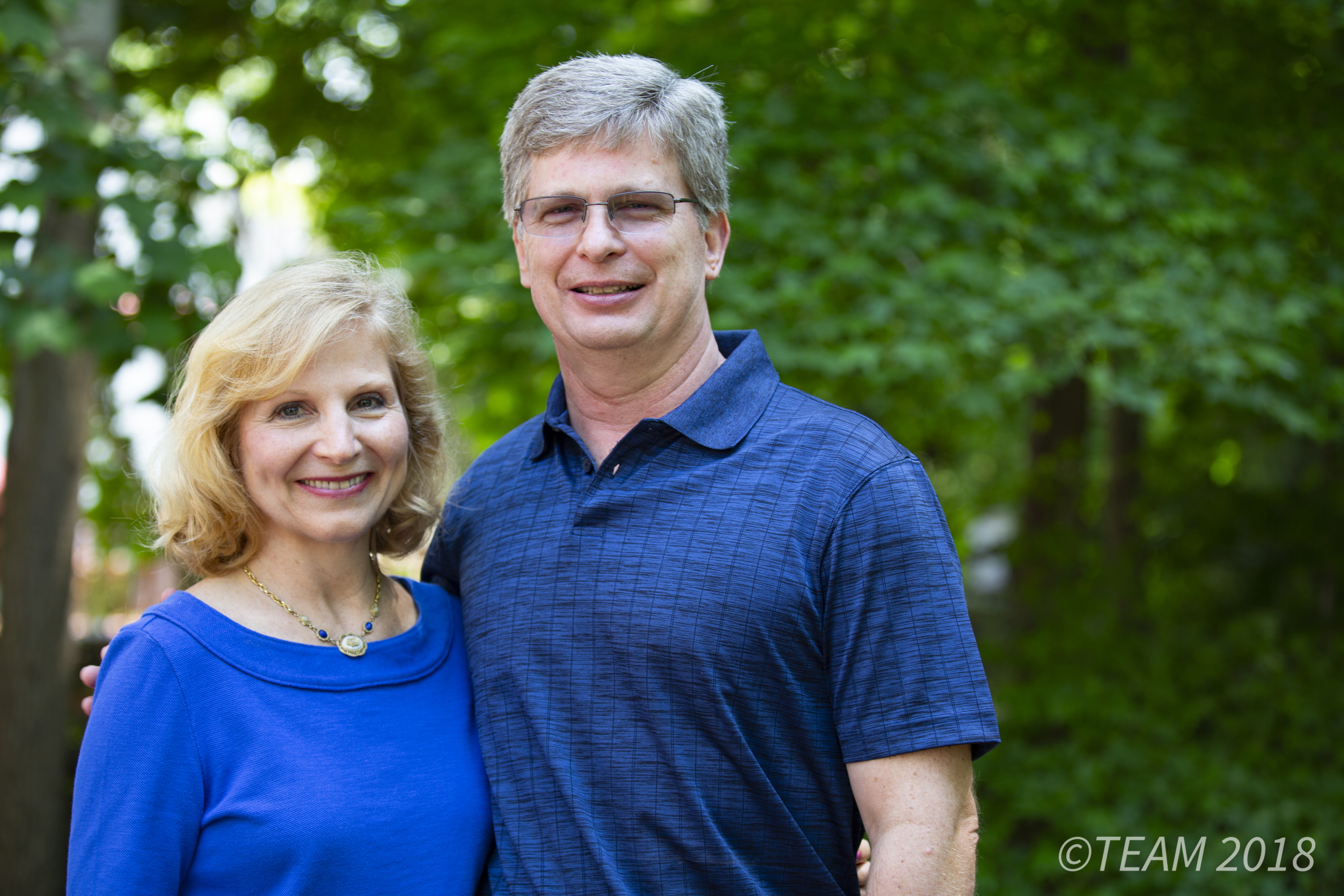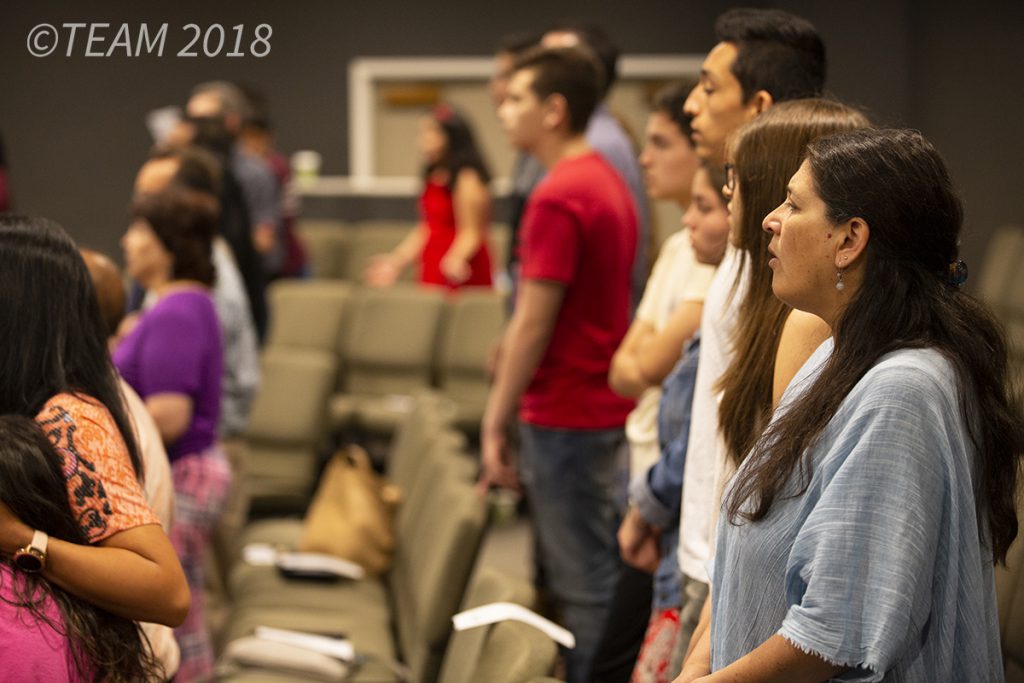
Ministry Updates
Called Home — to Reach the Same People
August 15, 2019
by Heidi Chupp

After serving overseas for nearly 30 years, Keith and Dawn Moore were back in their home country for a new assignment. Except it didn’t feel like home anymore.
This wasn’t the first time they’d felt like strangers.
When they served as TEAM missionaries in Colombia and Honduras, Keith and Dawn grew accustomed to hearing “What are you doing here?” Their light skin and hair made it a natural question.
Over time, they learned to welcome their visibility as a way to strike up conversations and start friendships.
But now they were transitioning from ministry in Latin America to ministry in the U.S. among Latin Americans.
They just blended in. No one was curious, so no one asked any questions.
There were other cultural patterns to adjust to as well. In the countries where they previously served, relational ties ran deep and wide. Whenever Keith or Dawn developed a friendship with one person, it naturally opened doors with parents, siblings, relatives and friends.
Now that they worked among immigrants, that family network was often missing, or limited at best.
But despite how strange and different Keith and Dawn’s new mission field felt, their vision remained the same: to build relationships and plant churches.
Discipleship in Latin America
Keith and Dawn moved to Bogotá, Colombia in 1991, to help plant a church. It was there that God gave them a dream to reach the professional class.
Keith worked with other TEAM missionaries and Colombian pastors to create a discipleship program. An increase in anti-American violence forced the Moores to leave Colombia in 2000. But by then, their church had grown to more than 500 members and planted three daughter churches.
Keith and Dawn moved to Tegucigalpa, Honduras, in 2001 — and brought the same vision with them.
They worked with a family from their Bogotá church and another TEAM missionary couple to reach out to bankers, lawyers, doctors and business owners.
By the end of the first month, 40 people filled the Moores’ living room every week for Bible study, worship and fellowship. They called the new church Impacto (“Impact”).
Over time, the church outgrew the Moore’s home and two other locations. More than 1,000 regularly attended weekly services, and churches were planted in three other Honduran cities.
Sent from Honduras to the U.S.
After Keith’s stepmother passed away in 2015, though, the Moores sensed that it was time to move closer to their aging parents. They began a two-year transition process, handing the Impacto leadership over to a Honduran pastor.
Keith and Dawn did some research and decided to plant a church in Charlotte, North Carolina, because of its heavy Latin American population.

Eventually, the Moores’ church plant in Honduras got so big, the congregation could send the Moores as missionaries to plant a church in the U.S.
Their commitment to relationships also guided them toward another decision.
“We asked the church to officially send us out as their missionaries,” Keith explains, “to come to the States to begin a church.”
With the support of Impacto Honduras, Keith and Dawn arrived in their new community in the fall of 2017, trusting God’s guidance to plant Impacto Charlotte.
Same Vision, New Strategies
It was culture shock all over again. While the Moores re-learned American culture, everyone else thought they looked right at home. They couldn’t start conversations just by standing out anymore.
“We’ve had to be really creative,” Dawn comments.
Dawn befriended neighbors from Bolivia and El Salvador. She and Keith signed up to volunteer at the local crisis pregnancy center to assist Spanish-speaking clients. At the grocery store or the park, their ears tuned into any Spanish they might hear.
Dawn met a woman from Venezuela when she and Keith stopped to watch a soccer game one day. The Moores discovered plentiful opportunities to share information with many of the Hispanic business owners in Charlotte. And there were always restaurants.
“We’ve eaten a lot of Mexican food,” Dawn says.
Honduran Friends Join Church Plant Effort
In the midst of all their efforts and some discouraging days, Keith and Dawn discovered how God had been preparing for their ministry long before they even considered it.

God works in amazing ways, including bringing members from Impacto Honduras to the Moores’ new church plant in Charlotte.
Juan and Yaniré, Impacto members from Honduras, had moved to Charlotte several years beforehand. They were delighted to learn of the Moores’ arrival, and they were eager to help.
Because the couple already understood Impacto’s vision, they became valuable partners in the ministry, serving in a variety of roles from treasurer to coffee-maker to home group leader.
“It was pretty exciting to know that we had people here ready to go,” Keith remembers.
In just a few weeks, about 20 people were gathering in the home where Juan and Yaniré lived with Yaniré’s mother. Soon the group ran out of space.
As they prayed about where to go next, Keith learned that a local church had been planning for years to open their doors to a Hispanic ministry. Just like that, Impacto had a larger place for worship services.
‘Planting Lots of Seed’
The congregation of Impacto Charlotte continues to grow today, both spiritually and numerically. In addition to their Sunday services, there are midweek home groups, classes for children and one-on-one Bible studies. Keith and Dawn are committed to see that growth continue and are grateful for how God is going before them.
“You just have to keep planting lots of seed and praying and waiting to see where the Lord leads,” Dawn says.
Even when that seed planting looks rather different on their new mission field.
To see more about this story, check out this video!
[su_youtube url=”https://www.youtube.com/watch?v=V8fp-cFRI6k&t=40s”]
The world of missions may be closer than you think! Talk with a missions coach to discover how God can use you as a missionary in the United States. We’ll help you explore your passions and the unique ways God can use you to reach the lost!
Related articles



